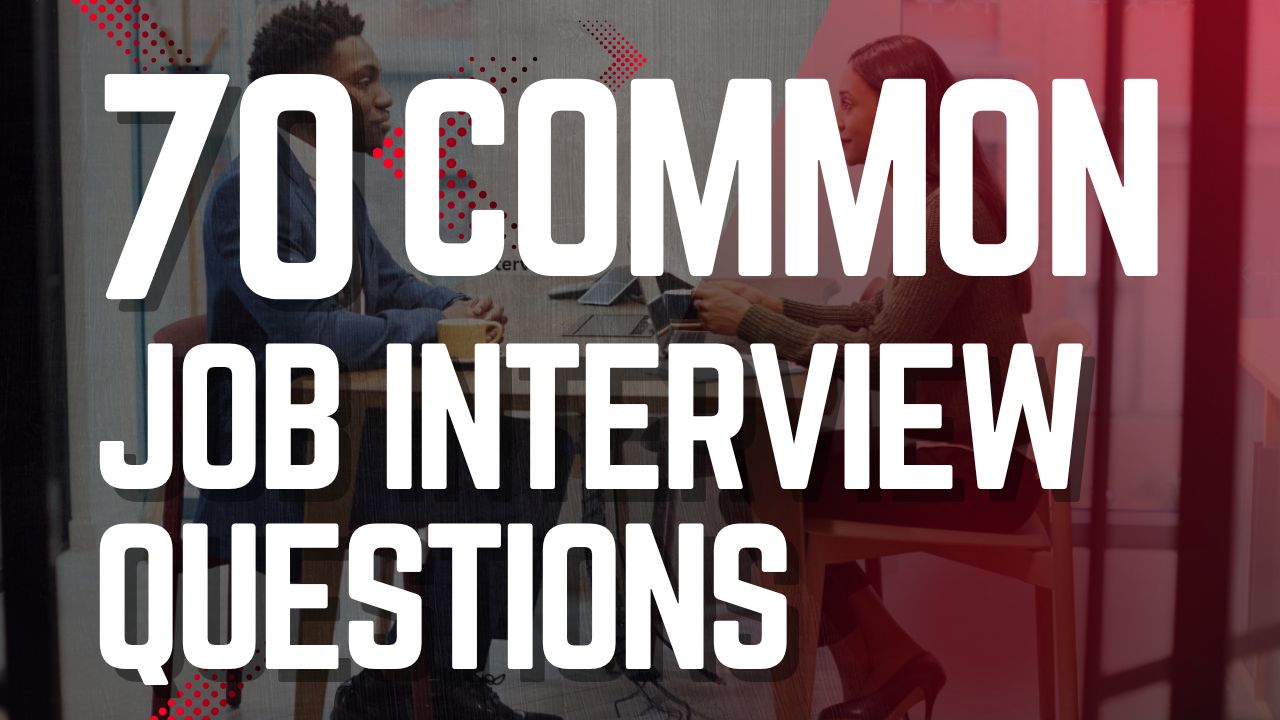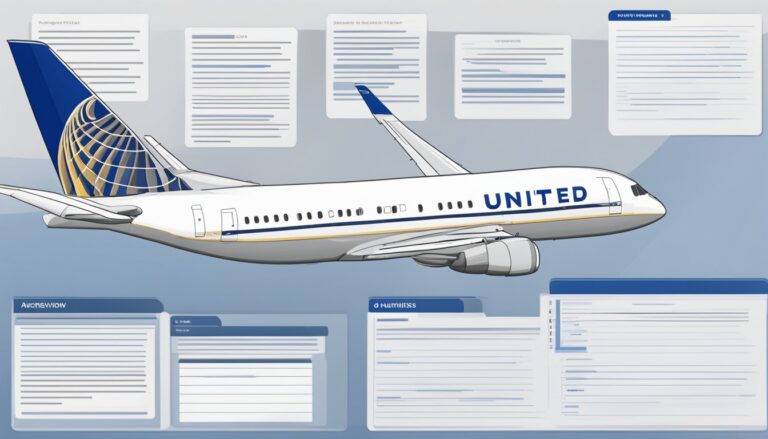70 Common Job Interview Questions: Master Your Next Interview

Job interviews can be an intense experience, and it’s natural to feel anxious about the questions that might come up.
What if you’re not prepared or don’t know how to answer them confidently? With the right guidance, you can kick start your preparation for the interview.

To help you get ready, this post covers 70 questions that are often asked during job interviews. Knowing what these questions are and how to answer them can greatly improve your chances of landing the job.
Whether they’re about your work experience, personal skills, or career goals, being prepared can make all the difference.
Each question reveals something important about what employers are looking for. You’ll get to see what makes you a good fit for the role and the company.
This preparation helps you connect your skills and experiences to meet the employer’s needs.
- Understanding the Interview Process
- List of 70 Common Job Interview Question
- Self-Introduction for Job Interview
- Skills and Experience
- Behavioral and Situational Questions
- Understanding the Role and Company
- Questions About Career Goals
- Work Style and Preferences
- Practical Considerations
- Finalizing the Interview
- Frequently Asked Questions
Key Takeaways
- Be ready for common interview questions.
- Show how your skills match the job.
- Know the company and role you’re applying for.
Understanding the Interview Process

The interview process can vary greatly depending on the position and company. It’s important to know the different types of interviews, what the interviewers are seeking, and how to effectively research a company to prepare.
List of 70 Common Job Interview Question
Here’s a list of 70 challenging job interview questions that can help assess a candidate’s skills, problem-solving abilities, and cultural fit:
- Describe a time when you faced a significant challenge at work. How did you overcome it?
- How do you prioritize your tasks when you have multiple deadlines?
- Can you provide an example of a project where you had to work with a difficult team member? How did you handle it?
- What strategies do you use to stay motivated during repetitive tasks?
- Describe a situation where you had to make a decision with incomplete information. What was the outcome?
- How do you handle criticism of your work?
- Tell me about a time when you had to learn a new skill quickly. What approach did you take?
- How do you ensure that your work aligns with the overall goals of the organization?
- Describe a time when you had to persuade someone to see things your way.
- What is your approach to managing conflicts within a team?
- Explain a complex concept related to your field to someone without a background in it.
- How do you handle stress and pressure in the workplace?
- Can you give an example of how you have used data to inform your decisions?
- Describe a time when you failed. What did you learn from that experience?
- How do you stay current with industry trends and developments?
- What role do you typically take on in team projects?
- How do you approach setting and achieving long-term career goals?
- Describe a time when you had to adapt to significant changes at work.
- What is the most innovative idea you have implemented in your previous job?
- How do you ensure quality in your work?
- Can you discuss a time when you had to manage a project with limited resources?
- What do you believe is the key to effective communication in a team setting?
- Describe a situation where you had to handle a dissatisfied customer or client.
- What techniques do you use to solve complex problems?
- How do you measure success in your role?
- Can you provide an example of a time when you went above and beyond your job responsibilities?
- How do you approach giving feedback to your peers?
- What is your experience with remote work, and how do you stay productive?
- Describe a time when you had to work under tight deadlines. How did you manage your time?
- How do you approach networking and building professional relationships?
- What do you think is the most challenging aspect of leadership?
- Describe a project where you had to collaborate with multiple departments. What was your approach?
- How do you handle situations where team members are not contributing equally?
- Can you discuss a time when you had to implement a new process or system?
- How do you balance work and personal life?
- Describe a time when you had to make a trade-off between quality and speed.
- What do you consider your greatest professional achievement?
- How do you approach goal-setting for yourself and your team?
- Can you give an example of how you have handled a significant change in your workplace?
- What do you think is the most important quality for a successful manager?
- Describe a time when you had to mentor or train a colleague.
- How do you approach problem-solving when faced with a tight deadline?
- What methods do you use to evaluate your own performance?
- Can you describe a time when you had to challenge the status quo?
- How do you ensure that you are meeting the needs of diverse stakeholders?
- Describe a situation where you had to manage expectations of your team or clients.
- What do you think is the biggest risk you’ve taken in your career?
- How do you stay organized in a fast-paced work environment?
- Can you discuss a time when you had to make a difficult ethical decision?
- How do you approach learning from your mistakes?
- Describe a time when you had to influence a decision at a higher level.
- What is your approach to managing your professional development?
- How do you handle competing priorities from different supervisors?
- Can you provide an example of how you’ve contributed to a positive team culture?
- Describe a time when you successfully implemented feedback from a performance review.
- How do you approach a situation where you disagree with your manager?
- What do you believe is the most important skill for success in this role?
- How do you handle situations where you need to deliver bad news?
- Can you discuss a time when you had to work with a cross-functional team?
- What strategies do you use to ensure effective collaboration in a remote setting?
- Describe a situation where you had to analyze a large amount of information to make a decision.
- How do you approach continuous improvement in your work?
- What do you consider when evaluating the success of a project?
- Describe a time when you had to take on a leadership role unexpectedly.
- How do you address performance issues within your team?
- Can you give an example of a time when you had to negotiate to achieve a goal?
- What is your approach to managing your time effectively?
- Describe a situation where you had to work with limited guidance or direction.
- How do you ensure that your work aligns with the company’s values?
- What do you hope to achieve in your next role, and how does this position fit into that vision?
Self-Introduction for Job Interview

Introducing yourself effectively during a job interview can set the tone for the rest of the discussion. It involves conveying your personal story, highlighting key experiences, and aligning your background with the job requirements.
Crafting Your Narrative
Creating a strong personal narrative helps showcase your strengths and make a memorable impression. Begin by outlining significant milestones in your career and education.
Think about the skills and experiences that best represent your journey. Focus on achievements that illustrate your growth and aspirations.
Adapt your narrative to connect with the job you are applying for. Highlight how your path has prepared you for this opportunity. This tailored approach shows your seriousness and eagerness for the role.
Answering “Tell Me About Yourself”
This common interview prompt is an opportunity to share your professional journey. Start with your most recent experiences and work backwards.
Mention your current role and responsibilities, followed by past jobs that shaped your career.
Highlight any significant achievements or skills that are relevant to the job. Keep your answer concise.
Discussing Your Resume
When asked to walk through your resume, provide a clear and structured overview. Begin by talking about your educational background. Mention degrees and any honors or awards.
Move on to your work experience, starting with your most recent position. Highlight key responsibilities and accomplishments that relate to the job.
This method demonstrates your ability to articulate your career and achieve a great fit for the position.
Skills and Experience

Your skills and experience play a crucial role in job interviews. You’ll need to clearly communicate your strengths, acknowledge any weaknesses, and highlight your professional achievements to show you are the best fit for the role.
Talking About Your Strengths
When discussing your strengths, focus on areas like experiences, teamwork, and problem-solving. Be specific about your skills, such as communication or the ability to work well under pressure.
Share examples where you successfully led a project or solved a tough problem.
For example, talk about how you led a team to meet a tight deadline, detailing the steps you took and the positive outcome.
Describing Your Weaknesses
Talking about weaknesses can be challenging. Start by choosing a real weakness, something not essential to the job.
It’s important to show self-awareness and a willingness to improve. You might say you struggle with public speaking but have taken steps like attending workshops to build confidence.
Be honest but focus on what you are doing to overcome this weakness. This shows growth and commitment to personal development.
Highlighting Professional Achievements
Highlighting your accomplishments can set you apart. Focus on professional achievements that demonstrate skills relevant to the job.
Use specific metrics when possible, such as increasing sales by 10% or leading a successful team project.
Describe the project, your role, and its impact. Employers are interested in how your successes can benefit their organization.
Share relevant awards or recognitions to further validate your contributions.
Behavioral and Situational Questions

Behavioral and situational questions help interviewers learn how you would handle various work situations. These questions assess your past actions and predict your future behavior.
Describing Past Experiences
Behavioral questions focus on your previous experiences. These might include handling a conflict, working in a team, or meeting a tight deadline.
You should describe specific events and your role in them.
Examples of behavioral questions:
- Tell me about a time you solved a problem at work.
- Describe a situation where you showed leadership.
Answer honestly and confidently. Use details to paint a clear picture of your actions and results.
Remember, they want to understand your behavior in real-life scenarios.
Answering Common Situational Questions
Situational questions ask how you would handle hypothetical work situations. They assess your problem-solving approach and decision-making skills.
Examples of situational questions include:
- How would you handle a difficult client?
- What would you do if you disagreed with a team leader?
Think about potential challenges and show your strategic thinking. Focus on solutions and outcomes. This helps interviewers see which role you might fit and how you handle pressure.
Understanding the Role and Company
In this part, you can learn how to prepare for a job interview by getting to know the job description, company culture, and potential growth opportunities. This can help align your motivations and find your dream job.
Job Description Insights
The job description is key to preparing for an interview. It’s more than just a list of tasks.
Focus on the skills and experiences mentioned. Think about how your past roles match these.
Consider the role’s main duties.
Showing that you understand these details can make you stand out as a candidate.
Learning About Growth Opportunities
It’s crucial to learn about growth opportunities within the company. Ask about training programs or promotion paths.
Knowing these can assure you of career progression.
Discuss professional development plans they offer employees. This can fulfill your career aspirations and help you achieve your dream job.
Think about how the company invests in its employees. Do they nurture talent and provide pathways to advancement?
These aspects are important in deciding if the role can grow with your long-term goals.
Questions About Career Goals

Career goals are essential when you’re applying for a job. They not only help you focus on what you want but also show the employer where you see yourself in the future. Interviewers are interested in seeing if your goals align with the job role they’re offering.
Short-Term and Long-Term Goals
When asked about short-term goals, focus on what you aim to achieve soon after starting the job. Examples might include mastering new skills or contributing to a project.
Highlight specific goals that are realistic and attainable within a year.
For long-term goals, discuss where you see yourself in 5-10 years. Express ambitions that display growth, such as leading a team or developing expertise in a particular area.
Make sure they are relevant to your industry and show your commitment.
Alignment with Job Role
Aligning your career goals with the job role can show dedication and foresight. If you’re applying for a marketing position, mention goals like advancing in digital marketing or leading a campaign.
This can indicate to the employer that you’re serious about the role.
It’s important to ensure your goals are logical next steps in the job you’re applying for. Discuss how the role fits into your plan and how it can help you achieve your career objectives.
Highlighting this connection can make you a more appealing candidate.
Work Style and Preferences
Understanding how you work best can help you succeed in any role. Knowing your approach to collaboration, the type of management style you thrive under, and your working environment expectations are crucial in finding a job that fits you.
Your Approach to Collaboration
Consider how you work with others.
Think about whether you prefer working in teams or independently.
Do you enjoy sharing ideas and brainstorming, or do you prefer to focus on tasks alone?
Flexibility is valuable.
Preferred Management Style
Reflect on the type of leadership that you find most motivating.
Do you like a hands-on manager who offers detailed guidance?
Or perhaps you prefer a more autonomous approach, where you have the freedom to make decisions and solve problems?
Clarity in what you need from a manager can lead to a more productive and enjoyable work experience.
Knowing whether you need regular feedback or prefer occasional check-ins can help both you and your manager understand how to work together effectively.
It’s also helpful to consider how you handle feedback and direction.
Being receptive to feedback shows a willingness to learn and grow within the company.
Working Environment Expectations
Think about the physical and cultural conditions that help you be most productive.
Do you thrive in a structured office setting, or do you work best in a flexible remote situation?
Identify the tools and technologies that you find most helpful.
Having the right resources available can greatly improve your efficiency and satisfaction at work.
Your working environment expectations can ensure that you and your employer are aligned, leading to a higher level of job satisfaction and success.
Practical Considerations
When preparing for a job interview, there are a few practical aspects to think about.
These include discussing your salary needs, work schedule, and your capability or readiness to travel as part of the job.
These conversations give clear insight into your limits and wishes.
Salary Expectations
Knowing your salary expectations is crucial.
Research similar job roles and industry norms to give you an idea of a reasonable salary range, considering your qualifications and experience.
Confidently state your requirements, but show some willingness to discuss options.
If asked about your salary expectations, provide a range rather than a fixed number. This can show flexibility in negotiating.
Highlight any qualifications or past achievements that support your requested salary.
Availability and Work Hours
Your availability and preferred work hours are important to discuss clearly.
Be honest about when you can start and the hours you can work.
Willingness to Travel
Discuss how open you are to traveling for work.
Some jobs require frequent travel, while others might need occasional trips.
Being upfront about your willingness to travel is important for roles that might require it.
Consider how travel will affect your personal life and balance it with your job duties.
If you have experience with travel from past roles, mention it, as this can be seen as an asset.
If there are limits to how much you can travel, communicate them openly.
Finalizing the Interview
Wrapping up your job interview includes some crucial steps.
It’s important to ask thoughtful questions to show your interest and to know what to do after leaving the interview to boost your chances in the hiring process.
Asking Insightful Questions
At the end of the interview, the interviewer might ask if you have any questions.
This is your chance to learn more about the company and show your enthusiasm for the role.
Ask questions that demonstrate you’ve researched the company, such as details about the team, new projects, or the company culture.
Avoid questions about salary or hours at this stage.
Instead, focus on the specifics of the job’s challenges or opportunities for growth.
Frequently Asked Questions
Interviews often include questions about your background, interests, and achievements. Being able to discuss these topics confidently can help you stand out as a candidate.
Can you tell me a little about yourself?
This is your chance to present a brief personal overview.
Focus on your professional background, key skills, and what you’re passionate about related to the job.
How did you hear about the position?
Employers want to know how you found out about the role.
Mention the source, like a company website or a networking event, to show your engagement with the industry.

What are your biggest strengths?
Choose strengths that relate directly to the job.
Explain how these strengths have helped you in past roles and how they can benefit the new company.
Where do you see yourself in five years?
Discuss your career goals and how they align with the company’s growth.
Show that you are ambitious yet realistic, emphasizing a commitment to the company’s success.
Why should we hire you?
Highlight your unique qualifications, experience, and what you bring to the team.
Address what sets you apart from other candidates.
What do you consider to be your biggest professional achievement?
Choose an achievement that showcases your skills and contributions.
Explain the impact it had and what it taught you. Make sure it relates to the job you’re applying for.
All the Best !






